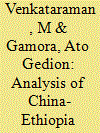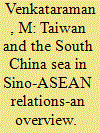| Srl | Item |
| 1 |
ID:
092415


|
|
|
|
|
| Publication |
2009.
|
| Summary/Abstract |
This article analyses the bilateral relations between China and Ethiopia during the Cold War period and brings out the interplay of domestic, regional and extra-regional factors that went into the shaping of bilateral relations. China's growing involvement and various attempts at consolidation of political and economic relationship with African countries-a relatively recent phenomenon-is perceived as a result of the dynamic interplay of economic and political factors. As with other African countries, China's interaction with Ethiopia in the post-Cold War period is markedly different from pre-1990 years. This article investigates the political/economic factors underlying this shift. It describes and analyses the factors that led to China's political and economic ties with Ethiopia (and Africa) during the years of Mao and Deng Xiaoping. It concludes that motivated by the desire to realise its priorities and goals, China's venture into Africa and Ethiopia was shaped by the shift in relations between the United States (US) and China and the Cold War dynamics in the Horn that prevented any kind of consolidation of relations with Ethiopia on the one hand and regime change in Ethiopia on the other.
|
|
|
|
|
|
|
|
|
|
|
|
|
|
|
|
| 2 |
ID:
070283


|
|
|
| 3 |
ID:
192939


|
|
|
|
|
| Summary/Abstract |
Seventy-six years after its establishment, the United Nations (UN) today stands at a critical juncture where it must undertake radical reforms to remain relevant in the changing face of the twenty-first century. Such reforms are essential to prevent the UN from becoming redundant and being pushed to the sidelines of great power politics in the emerging multipolar world. While there has been much political clamour among the international community calling for the restructuring of the UN Security Council, which is also in the interest of India, an appraisal of the UN’s military capability to intervene in Contemporary Armed Conflicts under Chapter VII of its Charter needs to be assessed. The absence of a standing reserve and the procedural complexities involved in deriving the manpower for peacekeeping operations from the member states have undermined the UN’s capability to swiftly intervene in an escalating armed conflict even after getting approval from the Security Council. At present, a plethora of factors have resulted in the increasing volatility of contemporary armed conflicts. Under these circumstances, the UN’s capacity for swift intervention after the outbreak of a conflict has become even more relevant today than in the past. The creation of a UN Vanguard Brigade based on the recommendations given by the 2015 High-Level Independent Panel on Peace Operations is a major step in that direction. Using a case analysis of the Rwandan genocide, this article critically examines the challenges of the vanguard brigade to optimise the UN’s capability for rapid deployment of peacekeepers for swift intervention in an escalating Armed Conflict. The article is largely descriptive and analytical, using predominantly secondary sources and UN documents.
|
|
|
|
|
|
|
|
|
|
|
|
|
|
|
|